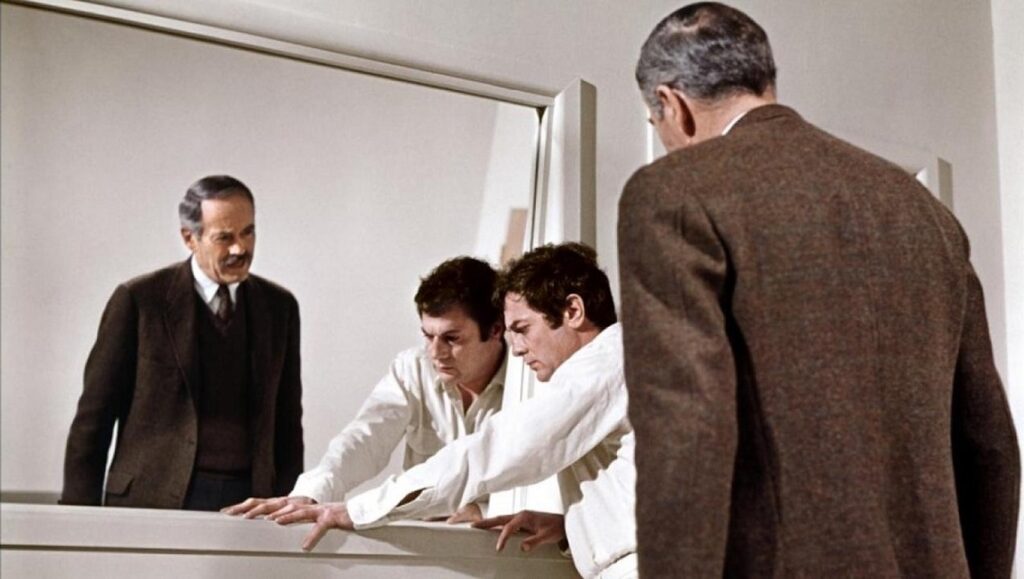In 1968, Richard Fleischer democratized the participants of the crime procedural with The Boston Strangler, spearheading a new school of form as applied to the frameworks of M or The Sniper, all seemingly enacted from moment to moment, scene to scene. Where Lang and Dmytryk followed various perspectives to their logical limits, lining up block after block of objectivity, Fleischer rammed together POVs, housing immediately incongruous experiences within off-kilter split screens and frames within frames, all contributing to a greater, overarching structure. Forgoing fact for an entrapping environment of unadulterated dread, The Boston Strangler renders the true-to-life serial killer — and his “Silk Stocking Killings” — first as an off-screen entity, characterized only by the grizzly aftermath of his crimes, before plunging headfirst into his psyche, remoteness suddenly swapped for discomfiting proximity.
Only a year removed from Bonnie and Clyde, Fleischer’s film is startling in its violence, unremitting in its penetrative bleakness; its timeline is linear, so that its more avant-garde instincts aren’t spurred by the temporal jumble of something like, say, John Boorman’s Point Blank. The mechanics of crime and its attendant adjacencies had always been something of a perennial fascination to this director, surveying the standard noir tropes (Armored Car Robbery), as well as half-crazy rich boys and their folly (Compulsion) — this predilection extends even to literally biblical transgression in 1961’s Barabbas. The Boston Strangler, however, is the necessary step toward Fleischer’s true modern crime masterpiece, 10 Rillington Place, stripping his filmmaking of any formal and narrative pretense. Even if it plays fast and loose with the spree of Albert DeSalvo (here played by Tony Curtis), it’s committed to the substance of the crime, cataloging the perfect set of circumstances for the murderer’s strangulations, both on his end and from the perspective of the ineffectual police department; the victims easily slip through the flimsy net the city has set up.
The film is clinical, but distanciation isn’t the end goal here: Fleischer wends his way across the independent elements of this larger equation, the split screen bringing hitherto divorced events into clearer, interlinked focus. A low-angle shot in one corner of the screen, low-lit and illegible in its subject, slowly reveals itself to be the POV of a dead body, left in its bedroom as roommates putter around outside, conveniently housed within another, on-screen frame. As the police victimize all marginalized peoples in their pigheaded ideas of criminology — and at one point, even flying in a renowned psychic — the bodies pile up into an anonymous entity, the duration of their prolonged non-discovery evolving into a terrifying constant. Paired with the funeral for JFK coming later in the film, Fleischer pulls back the curtain on a culture of murder, at a national and local level.
With a trio of police officials as portrayed by Henry Fonda, George Kennedy, and Mike Kellin, a whole spectrum of inefficiency rises to the surface: the faux-benevolence of the former, the roughneck methods of the latter two. Fonda’s performance is of particular interest, as Fleischer joined the lauded ranks of directors who could redirect the actor’s outward demeanor to more unnerving results, as originally perfected by John Ford and Otto Preminger, with Fort Apache and Daisy Kenyon, respectively, and later Don Siegel, whose Madigan gave Fonda a similar air of indifferent authority that very same year. Once Curtis’ total fluke of an arrest is achieved, he and Fonda have a tête-à-tête that strikes the middle point between the dry, dry psychology of Psycho and the superimposition-heavy crime fabrication scene of Spike Lee’s Clockers, where perspective collapses in on itself, Fleischer bounding back and forth between the cold interior of the interrogation room and the feverish tumultuousness of DeSalvo’s unconscious. The experimental enlivens the procedural, and in reverse, the procedural tempers the formal play. It’s too overblown and cliché to say that there’s nothing like The Boston Strangler, because as is the case with Fleischer’s career, his fingerprints are detectable all across American cinema, even if he himself has unfairly receded from view.
Part of Kicking the Canon – The Film Canon.


Comments are closed.